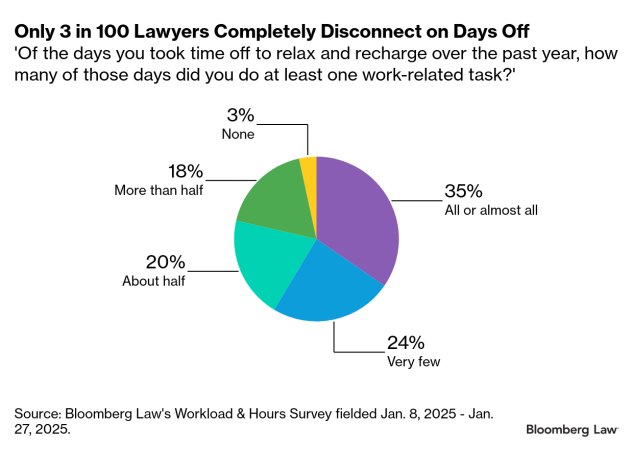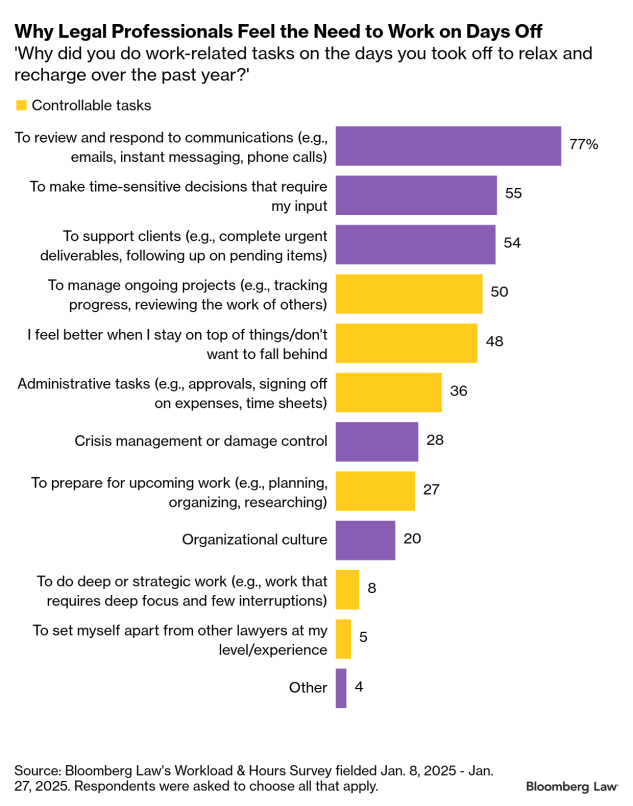It’s no surprise to hear an attorney say that they did some work while they were away on vacation or personal leave. What may be surprising, however, is just how widespread this is. In Bloomberg Law’s most recent Workload and Hours Survey, an astonishing 97% of legal professionals said that they’ve worked when they’re supposed to be on vacation.
Of those respondents who took time off in the past year, only 3% fully disconnected from work—in other words, they didn’t do any work-related tasks during any of their days off.
This raises an important question: Why is it so hard for legal professionals to truly unplug from their work, even when they’re officially “off the clock”?
The survey results suggest the answer lies in a combination of factors. On one hand, the legal profession is inherently demanding, with client expectations and case deadlines that don’t pause. But on the other hand, much of the difficulty stems from administrative and project management burdens. Lawyers often spend significant time on non-billable tasks like coordinating schedules, managing workloads, delegating responsibilities, and ensuring smooth operations while they’re away. These responsibilities—many of which are self-imposed—can make it feel impossible to step away without risking disruption or falling behind.
The top three responsibilities that prevent legal professionals from fully disconnecting during their “off” hours are intrinsic to the legal profession and are out of their control: responding to phone calls, instant messages, emails, and other incoming communications (77%), making time-sensitive decisions that require immediate input (55%), and providing real-time support for clients that care little about relax-and-recharge time (54%).
But large numbers of respondents also cited workflow- and project-related tasks as reasons for staying connected during their time off. Respondents reported that they review the work of others and manage ongoing projects even on their days off, with 50% saying it helps them stay organized and in control. Additionally, 48% said that staying on top of project tasks makes them feel better and less stressed, while 36% cited handling administrative duties as an essential part of maintaining order in their work.
These findings underscore a critical insight: Many legal professionals highly value control and strive to stop anything from slipping through the cracks while they’re away. This isn’t surprising; missing a project deadline in the legal profession can have serious consequences. However, this hypervigilance often comes at the expense of personal time.
The legal field is relentless, with demands that rarely pause for “me time.” Clients frequently expect 24/7 availability, filing deadlines leave no room for error, and staying informed on legal developments requires constant effort. This creates a high-pressure, fast-paced environment where inefficiencies in workflow only add to the burden.
Yet, legal professionals shouldn’t have to sacrifice rest—or more importantly, their personal time—due to poor workflow and project management. Addressing these inefficiencies before taking time off could help lawyers regain some balance, ensuring they don’t always have to be working when they should be unplugging.
In an upcoming analysis piece, we’ll explore the inefficiencies that lawyers find themselves managing even while on vacation—issues that could be eliminated with better processes and by embracing technology and innovation. By doing so, legal professionals can reclaim valuable time and reduce unnecessary stress in the long run.
Bloomberg Law subscribers can find related content on our In Focus: Legal Professional Well-Being page, our Well-Being Programs & Organizational Health page, and our Surveys, Reports & Data Analysis page.
If you’re reading this article on the Bloomberg Terminal, please run BLAW OUT to access the hyperlinked content or click here to view the web version of this article.
To contact the reporter on this story: Janet Chanchal in Washington at jchanchal@bloombergindustry.com
To contact the editor responsible for this story:



